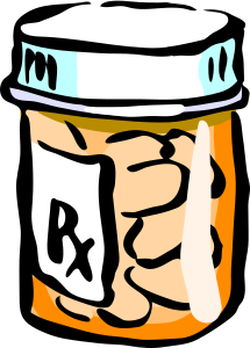 Prescription pill bottle by francesco_rollandin at openclipart.org
Prescription pill bottle by francesco_rollandin at openclipart.org Medication Descriptions:
Coumadin is the oldest medication on the list. It blocks vitamin K. Each person needs a different amount of Coumadin to achieve a safe range of medication. This amount of medication changes daily based on diet and other medications. Patients must eat a consistent amount of vitamin K daily in order to have the right amount of Coumadin. This medication is very picky. Too small of a dose raises the risk of clots and too high a dose raises the risk of a bleed. Because the dosing must be very precise in order to be safe and effective, people who take Coumadin must have routine blood tests. These tests may be done at home by working with a doctor to purchase a home testing machine or they can be done at a doctors office.
Lovenox is an injection that can be given at home by the patient. It is self-injected into the fat around the abdomen. Typically patients will do injections twice a day. Lovenox doses are much more consistent from patient to patient. For this reasons you will not need routine blood work done while you are on Lovenox. Lovenox is much more expensive than Coumadin, but you will not have to pay for weekly blood testing. Lovenox has no dietary restrictions. You can eat a massive salad one day and no vitamin K containing foods the next day without having to worry about your medication levels.
Xarelto is the newest of the approved medications. It is an oral medication. It has no dietary restrictions. It also is very consistent from patient to patient so it doesn't require routine blood work. As it is new, there are no generic versions of this medication. Payment assistance can be found on the manufacturer's website. Like Lovenox, Xarelto has no dietary restrictions.
Effectiveness of the Different Anticoagulants:
Studies have shown that all three medications are about equally matched in effectiveness when they are used as directed. As directed is very important to note. If you are prone to missing doses, the newer anticoagulants aren't for you. The new anticoagulants must be taken more frequently and they leave your body quickly. Missing a dose of medications like Xarelto will put you at a high risk of clotting. Coumadin has similar problems. If you can't maintain a high enough level of Coumadin, you risk a clot. If you don't feel that you can track your vitamin K intake or if your INR test results are showing a lot of fluctuations, you may want to ask your doctor about switching to a different medication.
Bleeding Risk:
Coumadin can have a high risk of major bleeds if the blood levels are not kept within range. This risk goes up with age and with certain health conditions. Out of the anticoagulants, Coumadin has the highest risk of cranial (head) bleeds. Coumadin takes 5-7 days to leave your system completely. If you start to bleed or need surgery an antidote will be needed. This can cause problems. Luckily, years of use have established many FDA approved means of reversing Coumadin's anticoagulant effect.
Lovenox has a similar risk of bleeds. It also takes a number of days to leave the body. For this reason it should not be used before surgery. Lovenox also has a number of FDA approved antidotes to reverse bleeding. Diet and dosing will not impact the bleeding risk. The biggest risk of bleeding on Lovenox is caused by heparin-induced thrombocytopenia. If you have ever had heparin-induced thrombocytopenia let your doctor know immediately.
Xarelto has a much lower risk of cranial (head) bleeds than the other two options. It does carry a higher risk of stomach and intestine bleeds. Other bleeding risks are the same whether you take Coumadin, Lovenox, or Xarelto. Xarelto leaves your body quickly. This can help in a bleeding situation. Currently there are no FDA approved methods of reversing Xarelto. There are some unapproved methods that can be used to reverse bleeding. The FDA is reviewing some possible methods of reversal so there may be an antidote in the near future. If you are having problems keeping your INR in range, Xarelto may put you at a lower risk of a major bleed.
Other Side Effects:
Everyone's body is different. You may find that your have side effects other than a bleed. If you are having something happen that is uncomfortable or unfamiliar I highly recommend talking to your pharmacist and medical team. Switching medications may make you feel a lot better while keeping you safe. If you switch and the symptom hasn't gone away, talk to your doctor as you may have another health problem that needs to be addressed.
Other Things to Continue:
If you have other health issues let your doctor know. Pregnancy, cancer, kidney or liver problems, and other health issues can change which medication is recommended for your situation.
Anticoagulants are a life saving class of medications that can help you to survive blood clots. When used correctly they are very safe. Very few people will have a life threatening bleed. For most people the risks of a clot far outweigh the risks of a bleed. While you will hear law firms advertising law suits against the newer anticoagulants, they are proving to be very safe and effective medications. Your doctor can review your options with you. Ask lots of questions and feel free to ask multiple pharmacists or doctors. These professionals are the best source of information about medications.

 RSS Feed
RSS Feed

